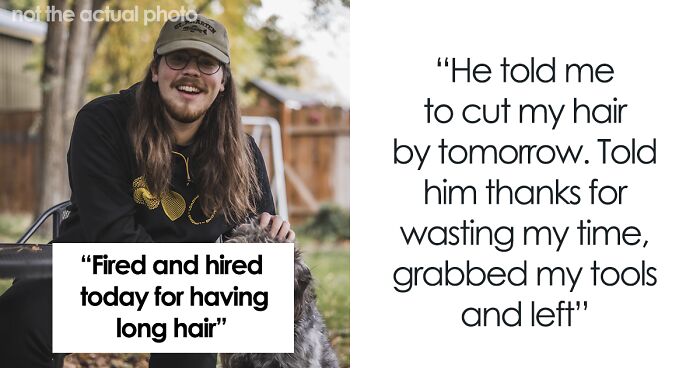
Delusional Boss Fires A High-Achieving Worker After He Refused To Cut His Hair Short For Work
Interview With AuthorHair can tell a lot about a person. Whether associated with political views — remember how all folks with long hair were deemed ‘flower people’ in the ’60s — or empowerment of race, there’s no surprise that some businesses will ridicule or try to take it away from their workers as an act of stripping away a piece of personality. Hence, the time-tested guides that recommend to people what types of hairstyles will increase their odds of nailing a job interview.
Just when we were about to believe that hair discrimination is a thing of the past, u/naturalviber‘s story showed that that’s not quite the case yet. As the author writes, his brand new plumbing gig was going great until the moment his boss saw what was hiding under his hat. Presented with an unfair ultimatum, this long-haired plumber turned to the r/antiwork subreddit to share his inspirational story.
Having your hair worn the way you like it is an important part of self-expression
Image credits: Connor Olson (not the actual photo)
While there are no available statistics for hair-based discrimination at work per se, recent studies showed that more than 1-in-4 employees in the US have experienced discrimination due to their looks. The number far less discouraging than it used to be, yet still greater than it should be allowed.
In order to learn more about the hairy situation that forced the author of the story to find a place that doesn’t discriminate against workers based on their appearance, Bored Panda reached out to the 28-year-old plumber. Despite being in the business for 6 years, this is the first time this Tennesee-based plumber has experienced anything like it. “They did not try to bring me back,” he told us. “And quite frankly, I do not wish to return there.”
As Jasmyn A. McCalla, an associate attorney and guest columnist, wrote in her article for Tennessean.com: “To date, neither the Tennessee courts nor legislature have addressed the nuanced issues posed by hair discrimination.”
The good news is that a week before Jasmyn’s piece was published, the Tennessee state senate unanimously agreed to join numerous other states, including California, New York and Colorado, to make natural hair discrimination illegal with the help of the CROWN Act (in Tennessee, the bill is still awaiting approval by the House of Representatives).
But as the following story shows, some workplaces opt to ridicule and force their employees to choose between the job and their hair
Speaking about the legal challenges of bringing hair-based discrimination at work before the court where a law, such as the aforementioned CROWN Act, which stands for “Creating a Respectful and Open World for Natural Hair,” doesn’t exist — Kevin Poulter, UK-based employment lawyer at Freeths LLP, says the situation isn’t as grave as it might seem.
“There are protections in place. However, how these things often come to light is not always as you might expect,” Poulter told Bored Panda. While Kevin doesn’t believe anything like CROWN Act will be implemented in the UK in the near future, there’s the Equality Act which “legally protects people from discrimination in the workplace and in wider society.” That includes discrimination based on sex, gender or religion. Although, when it comes to hair, the lines are a bit blurry.
Kevin, who has never personally dealt with a hair-based discriminatory case in his 20 years of service, explains it comes down to a few important factors. One of which is “indirect discrimination.” As he puts it, this can happen when a workplace’s policy indirectly discriminates against a specific group of workers.
“Let’s say company introduces a new policy which forbids people at front-of-the-house duties from having a beard. You would instantly assume that’s going to impact men more than women, right? And it’s also going to impact people like Sikhs, whose faith demands facial hair as part of the religion,” Poulter explained. “The question then is: does that make the policy automatically illegal or simply unfair?”
In some professions, such as food service work, where having your hair worn the way you like can impact the quality of a meal — finding an overriding reason to challenge policies that are set in stone might be a waste of a person’s time and money. As Kevin explains, “there has to be an overriding reason, which is proportionately a good reason” to cancel policy’s original rationale. In the previous case, arguing that “it’s difficult to see how having a beard or not having a beard makes any difference” in a role where you have to greet and speak with customers, this would be considered a valid reason to claim work-based discrimination.
People couldn’t believe hair discrimination at work is still a thing
While more and more people come forward with the stories of how they were ridiculed and discriminated in school and work — which is particularly true for black people who tend to experience it far more often than anyone else — Ruby Williams’ case was an eye-opening reminder that hair-based discrimination is a much bigger issue than one might expect.
Still, before taking legal action, Poulter advises bringing the concerns to the person in charge who might have discriminated against you unintentionally. “Speaking to an employer about how they are being treated by their colleagues or even the very same boss — that’s the first step of this process. Every organization has a Grievance policy available to formally raise concerns. Sometimes it might be a case of just doing it informally saying, ‘Can you please not say that?’ Or, ‘Can you please not refer to things that way?'” he explained.
Of course, history shows that informal attempts to discourage belittling managers from continuing their discriminatory actions bear little to no fruits. And, depending on where you live, this leaves only one solution: an employment tribunal that helps to hold “employers accountable for their actions.”
And what if this was a woman plumber? They do exist and women usually have longer hair. Would they treat them the same?
I'm pretty sure, that a boss who demands male plumber to cut his long hair for no reason (other that his own bigotry), would not hire a woman for this job. For the same reason, which os having a close mind and being a stupid sexist a*****e.
Load More Replies...The only plumber hair I care for is the one showing along their crack...Plumbers all over the globe, please mind the gap and wear suspenders!!! :-D
Never in all my years have I ever glanced at a plumbers rear pencil holder anywhere near long enough to notice hair in it. Maybe stop staring at it...? Im pretty sure it's part of their uniform.
Load More Replies...Maybe if it was considered a safety issue, but other than that, unless it looks like an unkempt rats nest I just don't see the issue.
Exactly. Across the board, in every sector, the only reason to complain about long hair is for health and safety reasons. It must be tied back if you are dealing with patients, food or machinery. It should be clean and neat if dealing with clients (you are representing the company and like it or not, impressions matter - if you have bigoted clients, that's a different matter). Otherwise, as long as you don't have a hate symbol shaved into your undercut, it should be nobody's business but your own how long/what colour your hair is.
Load More Replies...And what if this was a woman plumber? They do exist and women usually have longer hair. Would they treat them the same?
I'm pretty sure, that a boss who demands male plumber to cut his long hair for no reason (other that his own bigotry), would not hire a woman for this job. For the same reason, which os having a close mind and being a stupid sexist a*****e.
Load More Replies...The only plumber hair I care for is the one showing along their crack...Plumbers all over the globe, please mind the gap and wear suspenders!!! :-D
Never in all my years have I ever glanced at a plumbers rear pencil holder anywhere near long enough to notice hair in it. Maybe stop staring at it...? Im pretty sure it's part of their uniform.
Load More Replies...Maybe if it was considered a safety issue, but other than that, unless it looks like an unkempt rats nest I just don't see the issue.
Exactly. Across the board, in every sector, the only reason to complain about long hair is for health and safety reasons. It must be tied back if you are dealing with patients, food or machinery. It should be clean and neat if dealing with clients (you are representing the company and like it or not, impressions matter - if you have bigoted clients, that's a different matter). Otherwise, as long as you don't have a hate symbol shaved into your undercut, it should be nobody's business but your own how long/what colour your hair is.
Load More Replies...
 Dark Mode
Dark Mode 

 No fees, cancel anytime
No fees, cancel anytime 







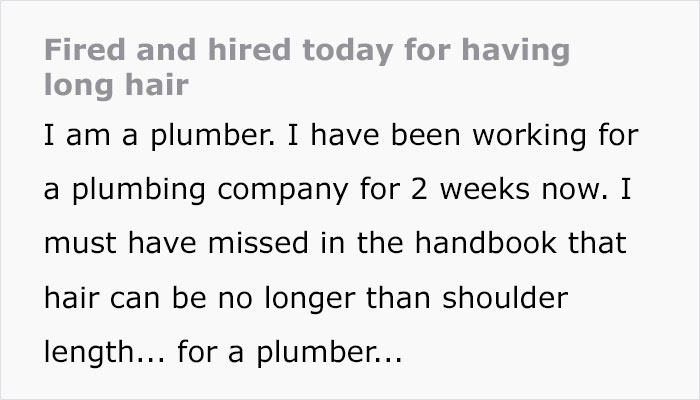



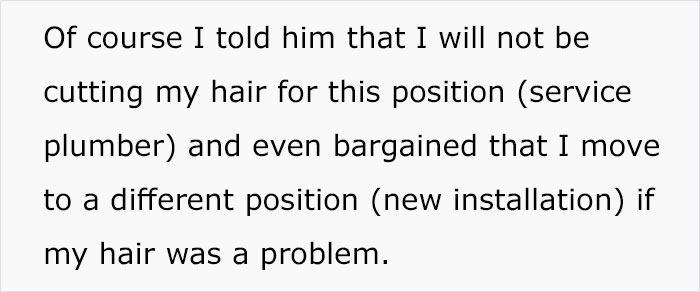

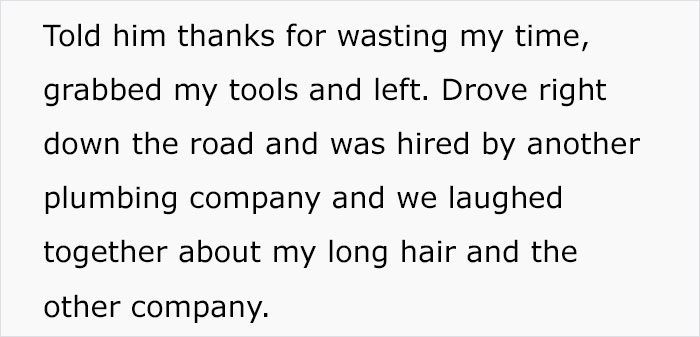




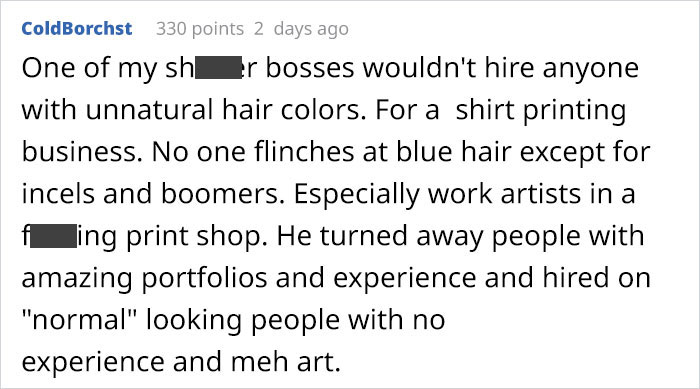
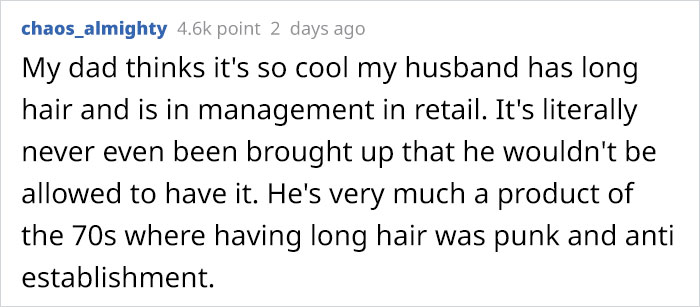



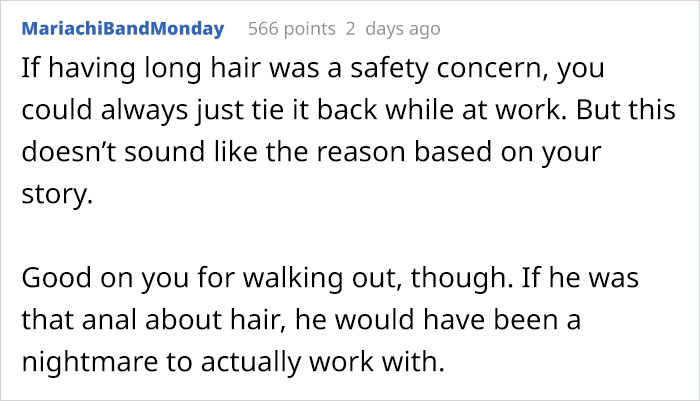
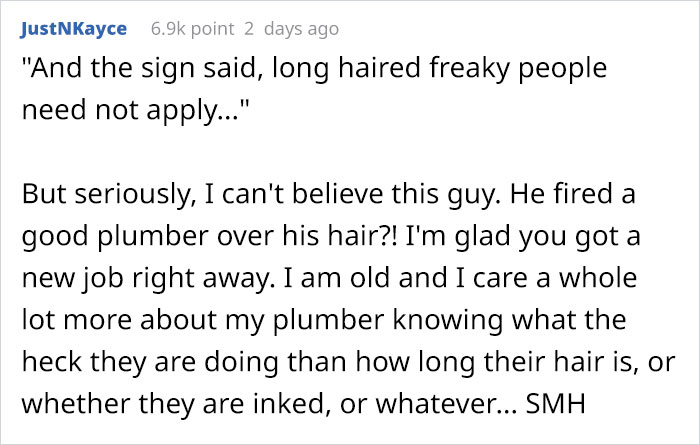













































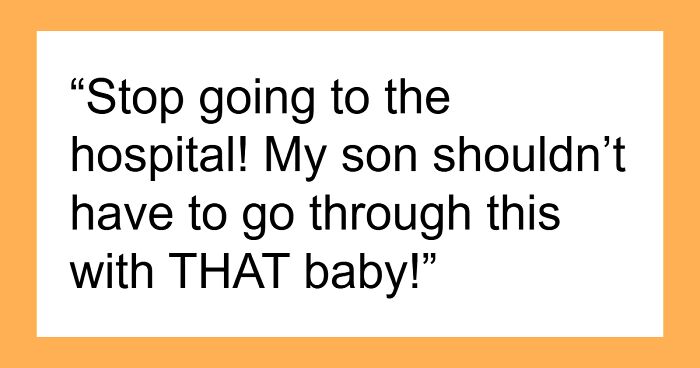


113
42